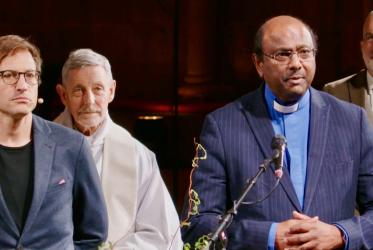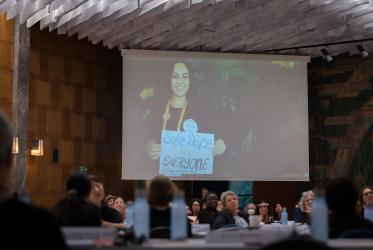The leadership of the World Council of Churches (WCC) Central Committee met in Geneva on 14-15 March to prepare for the Executive Committee meeting in June in Geneva.
The WCC continues to focus on its pilgrimage of justice and peace, preparations for the 11th Assembly in 2021 as well as its upcoming 70th anniversary. The WCC, formed in October 1948 in Amsterdam. During 2018, the WCC fellowship will not only celebrate significant milestones in the history of the WCC but also continue to address modern injustices and the ongoing struggle for a just peace.
Dr Agnes Abuom, moderator of the WCC Central Committee, recalled the WCC’s role as a convener since 1948. “WCC has brought people together for mission and unity so that they can serve as a catalyst for change and for just peace. The anniversary is an opportunity to remind us all of the call to churches around the world to work for peace and reconciliation.”
The WCC Leadership discussed how the pilgrimage of justice and peace leads us to new reflections on how to bring hope in a divided world, with growing conflicts and polarization.
WCC general secretary Rev. Dr Olav Fykse Tveit described the church on pilgrimage as a people defined by hope. “This is not about generalized optimism, but instead about conveying a reason and motivation for hope. Often it means being able to see beyond what we see and expecting something more and something else, looking for justice and peace, and nothing less. Hope is a criterion of our Christian faith.”
The Central Committee leadership includes, in addition to Abuom and Tveit, Metropolitan Prof. Dr Gennadios of Sassima and Bishop Mary Ann Swenson, both vice-moderators of the WCC Central Committee.
The WCC Central Committee, which meets every two years, is elected during the WCC assembly to serve as the chief governing body of the WCC until the next assembly. It is responsible for carrying out the policies adopted by the assembly. On the agenda this time: reports from the Commission of the Churches on International Affairs, the WCC World Mission Conference in Tanzania 2018, update from Faith and Order, joint meeting with ACT Alliance in Uppsala 2018 on Ecumenical Diakonia, mid-term evaluation, evaluation of the EHAIA programme, WCC-EAA and the implementation plan of the WCC-EAPPI evaluation, financial reports including preliminary results for 2016, income development, and an update on the Real Estate Development Project.





